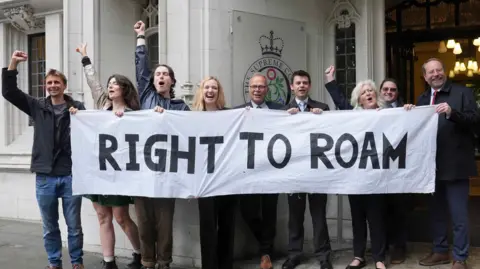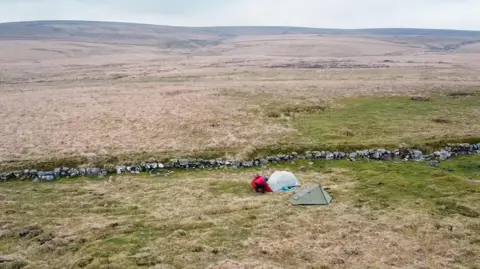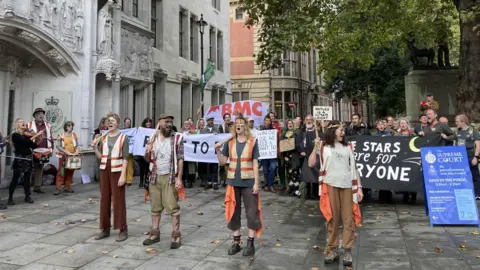Supreme Court backs wild camping on Dartmoor
 PA Media
PA MediaThe legal right to wild camp on Dartmoor has been upheld by the Supreme Court in a decision that is likely to reignite the debate over public access to land in England.
Judges unanimously rejected an appeal by landowners Alexander and Diana Darwall who said people should not be able to camp without permission from landowners.
In England there is no general right to wild camp on most private land but Dartmoor National Park in Devon is a rare exception.
The Darwalls said they were "disappointed" by the judgement adding: "Hollowing out the role of landowners and farmers will not improve the vitality of the Dartmoor Commons."
The judgement centred on the interpretation of the 1985 Dartmoor Commons Act that states "the public shall have a right of access to the commons on foot and horseback for the purpose of open-air recreation" which judges said were "open-ended and unqualified" and "naturally includes camping".
It follows a legal battle which began in 2022 when the Darwalls challenged the right to wild camp on their 4,000-acre estate on Stall Moor near Cornwood.
The Court of Appeal overturned the High Court ruling in July 2023, restoring the right to wild camp and the Darwalls appealed to the Supreme Court.
 John Harding
John HardingDartmoor National Park, designated in 1951, covers a 368-square-mile area which features "commons", areas of unenclosed, privately-owned moorland where locals can put livestock.
The Supreme Court judges pointed to the 1949 National Parks Act which places specific restrictions on activities such as killing animals, damaging the land or obstructing watercourses but does not mention camping.
Judges said "public regulation" of people's use of Dartmoor was "likely to be more effective in protecting the land than attempts by private persons to challenge such use through themselves having to confront people on their land and bring a claim in private law".
The Dartmoor National Park Association said it was "delighted and relieved" by the ruling.
Chief executive Dr Kevin Bishop said: "This is a landmark judgment not just for Dartmoor National Park but for people who have long campaigned for access rights.
"The judgement reaffirms our long-held belief for the public's right to backpack camp on certain commons and, importantly, our role in regulating and managing that access."
'Work with us'
Dr Bishop said people did not have a "blanket right to camp wherever, or do whatever, you want".
"With the right comes a responsibility to make sure that you tread lightly and leave no trace," he said.
"We have been robust in defending the right to backpack camp, we will be equally robust in ensuring that people exercise that right responsibly and with respect to landowners and farmers."
He said long term he wanted the government to "work with us to ensure that we have the tools and resources to manage responsible access".
And he urged the government "to look at lessons that can be learnt from the Dartmoor case before they publish the forthcoming Green Paper on access to nature and the countryside".

Guy Shrubsole, from the Right to Roam campaign, said he was "delighted, elated and relieved" at the judgement.
"I think it's shown the huge public interest in this case that people responsibly wild camp on Dartmoor every year and want to be able to continue to do so," he said.
He said it was "very unusual and odd that Dartmoor is the only place in England, Wales, where you can legally wild camp" and Right to Roam would be pressing the government to "extend that right to wild camp to other parts of England".
"People want a greater right of access to the countryside, let's pass a new law that gives people the right to roam," he said.
Nature minister Mary Creagh said she welcomed the Supreme Court ruling.
"Wild camping under the stars is one of life's great pleasures," she said.
"This government is passionate about bringing people closer to nature by creating nine national river walks and three new national forests."
 PA Media
PA MediaKate Ashbrook, general secretary of the Open Spaces Society (OSS), which supported the DNPA's legal fight, said the judgement was a "tremendous outcome".
The OSS wanted to see the right to wild camp on Dartmoor "extended, so that people could enjoy a night under the stars on all open country in England and Wales", she said.
"The Supreme Court's decision is generously and robustly argued," she said.
"We must now stimulate ministers to legislate in the same spirit across our countryside."
Caroline Voaden, Liberal Democrat MP for South Devon, said she was "absolutely thrilled" with the ruling.
"It is a vindication of something we've all known for a long time, that the stars are for everyone, and that access to nature is not a nice to have, but a fundamental necessity for a happy, healthy life.
"Wild camping is good for body and soul, I'm very pleased the judges could see this."
The Darwalls said they brought the case in order to safeguard Dartmoor.
"Our aim from the outset was to protect and preserve Dartmoor, its flora and fauna," they said in a statement.
"Landowners and farmers have always played a vital part in the conservation of Dartmoor."
Additional reporting by Clare Woodling, BBC South West, on Dartmoor
Follow BBC Devon on X, Facebook and Instagram. Send your story ideas to [email protected].
